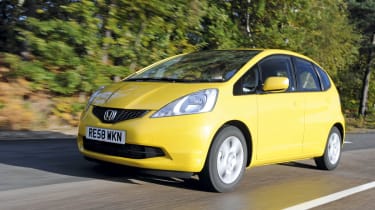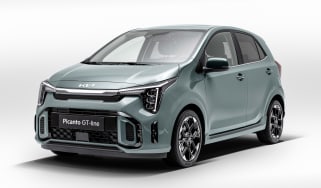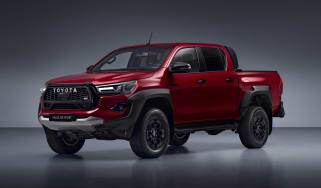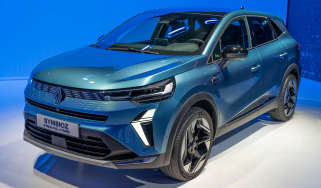Honda Jazz ES
Is Japanese baby back to its best?
Car manufacturers are often uneasy about identifying exactly who buys their cars. We’re told that every new model is aimed at an ever-younger audience, no matter what the reality.
Yet Honda has bucked the trend and come clean about the Jazz, admitting that the average age of its buyers is 63. And as the firm appreciates the value of a very loyal customer base, it isn’t about to turn its back on the more mature market. Instead, it hopes building on the strengths of the outgoing model will make the five-door irresistible to younger motorists, too.
Video: watch CarBuyer's video review of the Honda Jazz
[[{"type":"media","view_mode":"content_narrow","fid":"69240","attributes":{"alt":"","class":"media-image"}}]]
No matter what age group you fit into, you will certainly appreciate the Jazz’s reliability record. Glowing reports in our Driver Power owner satisfaction survey year in, year out show the engineering integrity behind the Honda is second to none. The new version has grown every way but upwards. While its height remains the same, it’s now 55mm longer, at 3,900mm, as well as 20mm wider, at 1,695mm. So, have the changes made the Jazz better proportioned? We don’t think so. Some of the outgoing model’s cheeky features have been replaced by a more generic Honda appearance. It’s not as distinctive as the Civic and takes on a more traditional Japanese city car look than we had hoped.
The key to this Honda’s success has always been its cabin, though, and things have got even better inside. Up front, the old car’s basic dash design has been replaced by a much more modern one. Three neat pods of dials sit behind the upmarket steering wheel, while the simple centre console is clear and concise. And although some hard plastics are used, we prefer the dash to the Civic’s.
Take a look in the rear and the Jazz starts to get really clever. As with its predecessor, the new Honda has unique back seats which fold in two ways.
Firstly, from the rear the squabs can be lifted up to the chair backs to leave a huge area behind the front seats that is big enough to take a chest
of drawers. Want a more conventional load space? No problem: the seatbacks and squabs can also tumble forward to provide a deep, flat area which is 1,470mm long – 30mm more than in the Note and 120mm over the Fiesta’s.
Yet even with five occupants on board the Jazz is a work of design genius. The 1,000mm- wide boot not only has a 20mm advantage over both rivals,
but lift the floor and you will discover another hidden tray complete with a luggage net to stop items sliding around. Take a seat in the back and you will enjoy 40mm more legroom than you would in the old Jazz, and 60mm more than in the new Fiesta. Only by moving up to an estate car from the class above can you get close to the Honda’s versatility.
Once you’ve finished playing with the cabin in the showroom, you’ll have to choose between two new engines. While there is still no diesel option, the fresh powerplants benefit from Honda’s legendary i-VTEC technology. That means both the 79bhp 1.2 and the 99bhp 1.4-litre unit tested here are much more powerful than their predecessors, as well as being more efficient. The old CVT-7 transmission has been ditched in favour of a six-speed automated manual gearbox badged i-SHIFT, or you can stick with the standard five-ratio manual fitted to our car.
In keeping with the cabin’s solid feel, the range-topping 1.4 sounds whisper-quiet at idle from the driver’s seat. The light, precise feel to the pedals and gearshift has been carried over from the outgoing model, while performance is notably improved. We managed to achieve a 0-60mph time of 11.1 seconds, making the Honda the fastest-accelerating model in our trio. But even though the car has longer gear ratios, you have to rev the four-cylinder unit hard to make swift progress – and putting up with 3,400rpm at 70mph soon gets tiresome on the motorway.
This is compounded by the fact that the Jazz’s Achilles’ heel hasn’t been entirely ironed out: the ride quality is still the hardest here. Dealing with potholes and speed humps isn’t a problem – it’s minor surface imperfections which unsettle the Honda. Other handling attributes remain sharp, but we can’t help feeling that the Jazz has lost its edge. While the steering is still direct, changes in direction are accompanied by more body roll than in the Fiesta. The Japanese model isn’t as agile, either.
Although the Honda is available from £9,990 in basic trim, our mid-spec 1.4 ES costs £11,490. That makes it £605 cheaper than the Fiesta, and £205 less than our Note. No other vehicle on the planet offers so much space in such a small body, no matter what your budget. The only question is whether the rest of the Jazz package has improved enough to beat its latest supermini competitors.
Details
Price: £11,490
Model tested: Honda Jazz ES
Chart position: 2
WHY: Outgoing car had class- leading versatility. Can new version build on that success?
Economy
On a financial basis the latest Jazz makes real sense. Not only is it the cheapest car to buy here, but it’s predicted to hold on to its value best, too. Our experts estimate that it will lose £6,388 over three years and 30,000 miles, while the Ford and Nissan shed £7,124 and £7,309 respectively. Reasonable running costs, good fuel economy and decent equipment levels all add to its appeal, too. On top of this, when your car needs servicing, Honda’s dealer network is in a class of its own in this company – it came sixth out of 30 in our Driver Power 2008 survey.
Environment
Emissions of 128g/km decrease by 3g/km if you opt for the clutchless manual box. Our Jazz test car was economical over our varied route, returning 39.8mpg.



